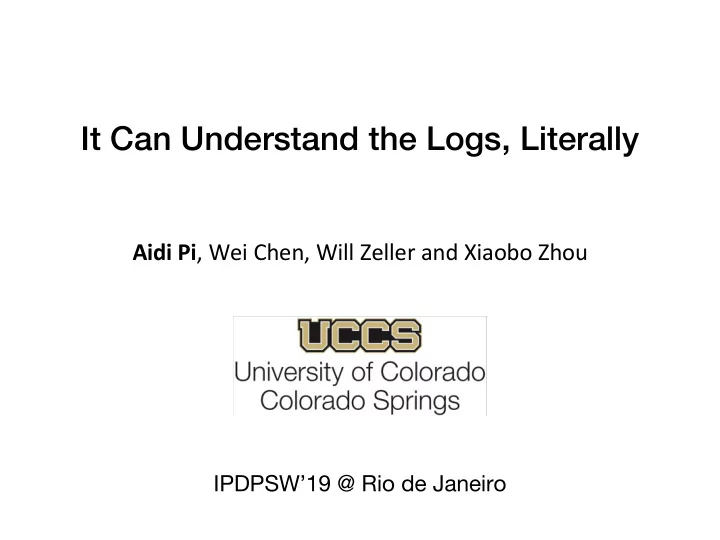

It Can Understand the Logs, Literally Aidi Pi , Wei Chen, Will Zeller and Xiaobo Zhou IPDPSW’19 @ Rio de Janeiro
Outline • Introduction to distributed system logs • Challenges • NLog: A NLP based log analysis approach • Evaluation • Conclusion
Logging in general • Logging is a general approach to record events in a system • System logs are critical for understanding and troubleshooting targeted systems
Challenges in log analysis • Large number of log files • Rich information in log messages • Identifiers, entities, events, etc. • Effectiveness in information extraction • A single log message contains multiple fields • Multiple log messages can contain information about the same object
A motivation example Task 39 force spilling in-memory map to disk and it will release 159.6 MB memory • Existing approaches only extract identifiers and numeric values • NLP approaches can extract events from logs
Logs in natural languages Frameworks NL logs Total logs % of NL logs Yarn 84652 88628 99.5% Spark 106686 106686 100% MapReduce 85752 92648 92.6% Average - - 97.4% • Our observation finds that most logs of data analytics frameworks are written in a natural language
NLog • NLog: a Natural Language Processing (NLP) based approach • It can identify objects and events even without identifiers in logs • Targeted systems: distributed data analytics frameworks
NLog overview 2. 1. 4. 3. 1. Message type parsing: a solved problem by Spell* 2. Identification of key objects 3. Finding identifiers and numeric values 4. Storing parsing results in keyed messages** * M. Du and F. Li,“Spell: Streaming parsing of system event logs” in proc of ICDM’17. **A. Pi, W. Chen, X. Zhou, and M. Ji, “Profiling distributed systems in lightweight virtualized environments with logs and resource metrics” in proc of HPDC’18
Step 1: message type parsing • Message type: the static string sequence of in a corresponding log printing statement fetcher 4 about to shuffle fetcher * about to shuffle output of map attempt_1 output of map * decomp: 1965 len 1969 to MEMORY decomp: * len * to MEMORY
Step 2: objects & event extraction by NLP • Part-of-speech analysis: tag each word in a log message with its part-of-speech • Find all the noun words • Filter noun words with a top α frequency • Key object words have higher frequencies • Assign key objects as keys of a log message
Step 3: identifiers & values • Identifiers: Numeric following a noun word • Values: All other numeric value • Numeric values followed by units e.g. kb or ms
An example : put it all together • The parsing results are in key-value format • Users use queries on the results for troubleshooting purposes
Evaluation setup • Setup • Evaluation is conducted on a 25-node cluster • Four Xeon E5-2640 v3 CPU and 128GB memory per node • Cluster is connected by 10-Gbps Ethernet • Yarn-3.0.0-alpha, Spark-2.1.0 • Log files • Randomly choose 20 MB of of 2GB files
Accuracy of object identification Frameworks Total Correct Accuracy Yarn 115 99 85.3% Spark 34 32 94.1% MapReduce 92 86 93.5% • Inaccurate message types • All of its keys have too general meanings e.g. service • None of the keys includes the key objects
A case study Spark TPC-H job Inspect the number of tasks during job execution Number of concurrently running Containers receive uneven number tasks vary during job lifetime of tasks The uneven task number distribution is caused by bug in Spark
Conclusion • NLog, a NLP-based approach to identify key objects, identifiers and values in logs • It is accurate in key object extraction • It is helpful in understanding and troubleshooting targeted systems
IntelLog ‣ IntelLog: a comprehensive NLP-based log analysis approach • Objectives: • Information extraction • Automatic workflow reconstruction • Automatic problem detection • IntelLog will be published in HPDC’19, Phoenix, AZ, USA
Thank you! Q & A
Recommend
More recommend